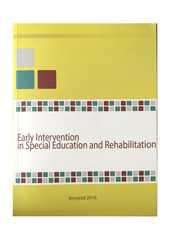| dc.creator | Grbović, Aleksandra | |
| dc.creator | Dimoski, Sanja | |
| dc.date.accessioned | 2022-03-01T09:42:22Z | |
| dc.date.available | 2022-03-01T09:42:22Z | |
| dc.date.issued | 2016 | |
| dc.identifier.isbn | 978-86-6203-086-3 | |
| dc.identifier.uri | http://rfasper.fasper.bg.ac.rs/handle/123456789/4188 | |
| dc.description.abstract | Emergent literacy consists of the skills, knowledge, and attitudes toward literacy,
that are developmental precursors to reading and writing. We could consider emergent
literacy a foundation of literacy, or set of pre-reading skills, that a child gains from birth
until formal instruction in reading and writing. Pre-reading skills represent the basic
knowledge about literacy, which includes general knowledge and concepts, language
skills and perceptual-motor skills. Typically developed children learn these skills
naturally, during the childhood, from birth until the beginning of formal instruction in
reading and writing, at home and from the environment.
Children with visual impairment (both blind and low vision) cannot attain prereading
skills without instruction. Visual impairment limits a child’s incidental learning
and decreases opportunities for gaining access to experiences. Infants and toddlers with
visual impairments require lots of interactions and early life experience that supports
their oral language development, perceptual-motor development, awareness of print or
Braille and opportunities to explore writing.
Pre-reading activities for visually impaired children need to be organized within
early intervention. Professional support and structured activities play a key role in
facilitating interactions of visually impaired children with the environment and directly
providing them with different experiences. The support must be directed towards gaining
meaningful language, literacy concepts and perceptual-motor skills that directly enable
acquisition of literacy, either print or Braille.
Early structured intervention and a team approach, with the aim of supporting prereading
activities, can be important predictor of successful reading competence of blind
or low vision child later in the school. | sr |
| dc.language.iso | en | sr |
| dc.publisher | University of Belgrade, Faculty of Special Education and Rehabilitation, Serbia / Univerzitet u Beogradu – Fakultet za specijalnu edukaciju i rehabilitaciju | sr |
| dc.rights | openAccess | sr |
| dc.rights.uri | https://creativecommons.org/licenses/by-sa/4.0/ | |
| dc.source | Thematic Collection of International Importance- Early Intervention in Special Education and Rehabilitation“, Beograd, Srbija, 2016. | sr |
| dc.subject | pre-reading skills | sr |
| dc.subject | children with visual impairment | sr |
| dc.subject | early literacy | sr |
| dc.subject | role of early intervention | sr |
| dc.title | Role of early intervention in acquisition of pre-reading skills of children with visual impairment | sr |
| dc.type | conferenceObject | sr |
| dc.rights.license | BY-SA | sr |
| dc.citation.epage | 111 | |
| dc.citation.spage | 101 | |
| dc.identifier.fulltext | http://rfasper.fasper.bg.ac.rs/bitstream/id/6271/Untitled6.pdf | |
| dc.identifier.rcub | https://hdl.handle.net/21.15107/rcub_rfasper_4188 | |
| dc.type.version | publishedVersion | sr |


